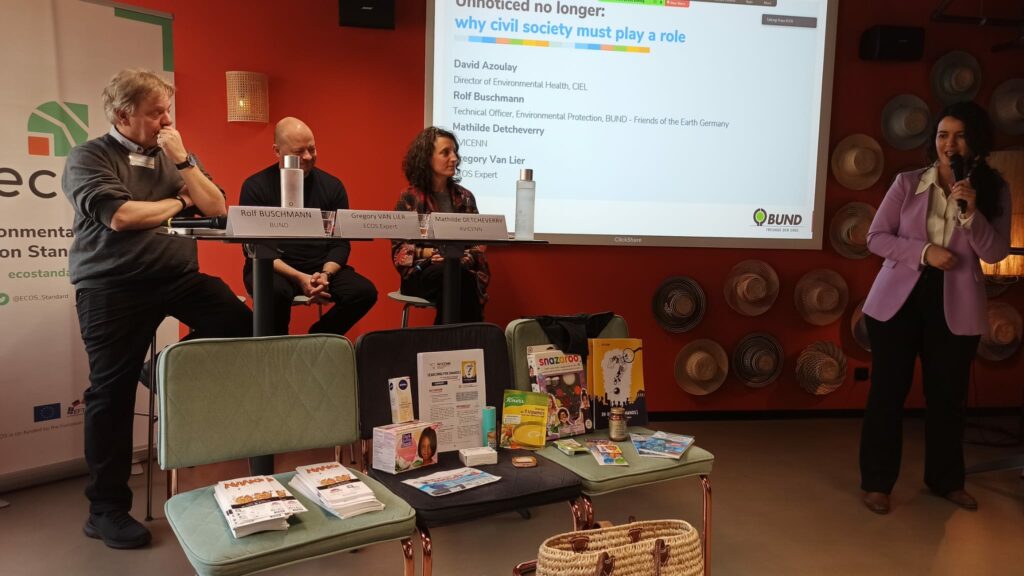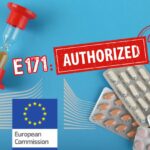
Unnoticed and unregulated? How nanos slip through the net in Europe
A half-day discussion organized in Brussels on the governance of nanotechnology showed the limits of the European regulations and the insufficient weight of the non-profit civil society organizations in this process.
On February 15, 2023, AVICENN spoke at a half-day event entitled “Unnoticed and unregulated: how nanomaterials slip through the net”, organized by ECOS and BUND (Friends of the Earth Germany) in Brussels. Steffen Foss Hansen (DTU), Andrej Kobe (European Commission), Aida Ponce del Castillo (ETUI), David Azoulay (CIEL), Gregory Van Lier (expert for ECOS) and Rolf Buschmann (BUND) also spoke to discuss the challenges of nanos governance.
A recording of the event is available here.
An opportunity to review the European regulatory framework for nanos and their risks
Nanos… insufficiently supervised
The first session of this event focused on the limits of regulatory tools and risk assessment associated with nanomaterials on the market.
It is clear that 15 to 20 years after the first warnings and despite the demands and recommendations of civil society and certain institutions such as ANSES and the European Parliament, the risks specific to nanomaterials are still insufficiently addressed.
REACH, for example, the main tool regulating the production, import and marketing of chemicals in Europe, has only incorporated the issue of nano-forms of chemicals from 2020 onwards – and not very efficiently. In the registration files filled out by manufacturers, specific information on nanosubstances placed on the market above one ton per year is now required but no prior authorization is required for the use of nanomaterials in products, with the exception of biocides, food and cosmetic products and medical devices. According to Andrej Kobe, representative of the European Commission (DG Environment), this is not going to change…
Unnoticed Nanos: An undeniable lack of information
The speakers all agreed on the persistent lack of information concerning the use and the marketing of nanos in Europe and in particular concerning the associated risks.
On February 14, ECOS and BUND published a briefing note whose purpose is to improve the OECD technical guides and guidelines by adapting them to nanomaterials and adapted materials. Their recommendations intend to support the development of a stronger European policy framework for nanomaterials through specific regulatory measures.
The scientist Steffen Foss Hansen also emphasized the need to improve information about nanos throughout the life cycle of products that contain them.
A nano definition that risks widening the net?
One of the notable developments in the governance of nanos in Europe is the adoption of the new 2022 recommendation for the definition of the term “nanomaterial”. According to EU official Andrej Kobe, it should resolve the interpretation and application problems with the old 2011 recommendation. This definition should soon be integrated into the REACH regulation as well as into sectoral regulations (Cosmetics, Novel Foods, Medical Devices).
However, many stakeholders have doubts: ANSES in France, but also AVICENN or Steffen Foss Hansen share strong concerns about this definition. Steffen Foss Hansen has criticized in particular the threshold of 50%, which risks making invisible a large quantity of nanos and complicating the identification of products that contain them. This is also what the tests of everyday consumer products published by AVICENN at the end of December 2022 showed.
How to improve nano regulations in Europe
Early involvement of civil society
A second discussion time focused more specifically on the role of non-profit civil society organizations in the development of the regulatory framework governing nanos, a role too often marginalized.
The technical nature of the debates and the multiplication of discussion spaces, coupled with the limited financial and human resources of NGOs, were mentioned by the stakeholders as factors that exclude their participation in the decision-making process. Mr. Van Lier (expert for the NGO ECOS) testified that he was the only representative of civil society around the table to discuss standardization issues (OECD meetings), whereas he believed the presence of NGOs in the standardization process to be essential.
Fund independent research
Mathilde Detcheverry, from the AVICENN association , regretted the lack of funding for academic research on nano-risks and of independent scientists who are needed to support NGOs and public decision makers.
Linking scientific and regulatory debates with concrete realities
According to the NGOs present, the increasing technical nature of the debates also has the consequence of demobilizing civil society, which no longer feels concerned. AVICENN, by testing 23 everyday products widely marketed in Europe, wanted to bring to light the question of chronic – and “off the radar” – exposure to nanos. Taking an interest in the material dimensions of regulations does not only encourage the participation of civil society in the debates, but also ensures that regulations are more relevant and adapted to the needs.

Upcoming Nano Agenda

- Scientific conference
- 23rd International conference on Advanced Nanomaterials
- From July 23 to July 25, 2025
- Website: www.advanced-nanomaterials-conference.com

- E-learning program: awareness-raising for personnel who come into contact with nanomaterials during research, formulation, production, maintenance, cleaning, upkeep, etc., as well as safety coordinators or engineers, facility managers, heads of laboratories where nanoparticles are handled.
- Organizers: INSTN Grenoble (CEA)
- On the program:
- 1 – Introduction, definition and characteristics of nanomaterials
- 2 – Toxicity of nanomaterials: the state of knowledge
- 3 – Metrology and characterization of nanomaterials
- 4 – Prevention and protection against nanomaterials in the workplace
- 5 – Quiz: assessment of learning outcomes
- The 2-hour course can be viewed for one month from the date of registration.
- Website: https://instn.cea.fr/…risques-lies-aux-nanomateriaux…

- E-learning program: awareness-raising for personnel who come into contact with nanomaterials during research, formulation, production, maintenance, cleaning, upkeep, etc., as well as safety coordinators or engineers, facility managers, heads of laboratories where nanoparticles are handled.
- Organizers: INSTN Grenoble (CEA)
- On the program:
- 1 – Introduction, definition and characteristics of nanomaterials
- 2 – Toxicity of nanomaterials: the state of knowledge
- 3 – Metrology and characterization of nanomaterials
- 4 – Prevention and protection against nanomaterials in the workplace
- 5 – Quiz: assessment of learning outcomes
- The 2-hour course can be viewed for one month from the date of registration.
- Website: https://instn.cea.fr/…risques-lies-aux-nanomateriaux…







